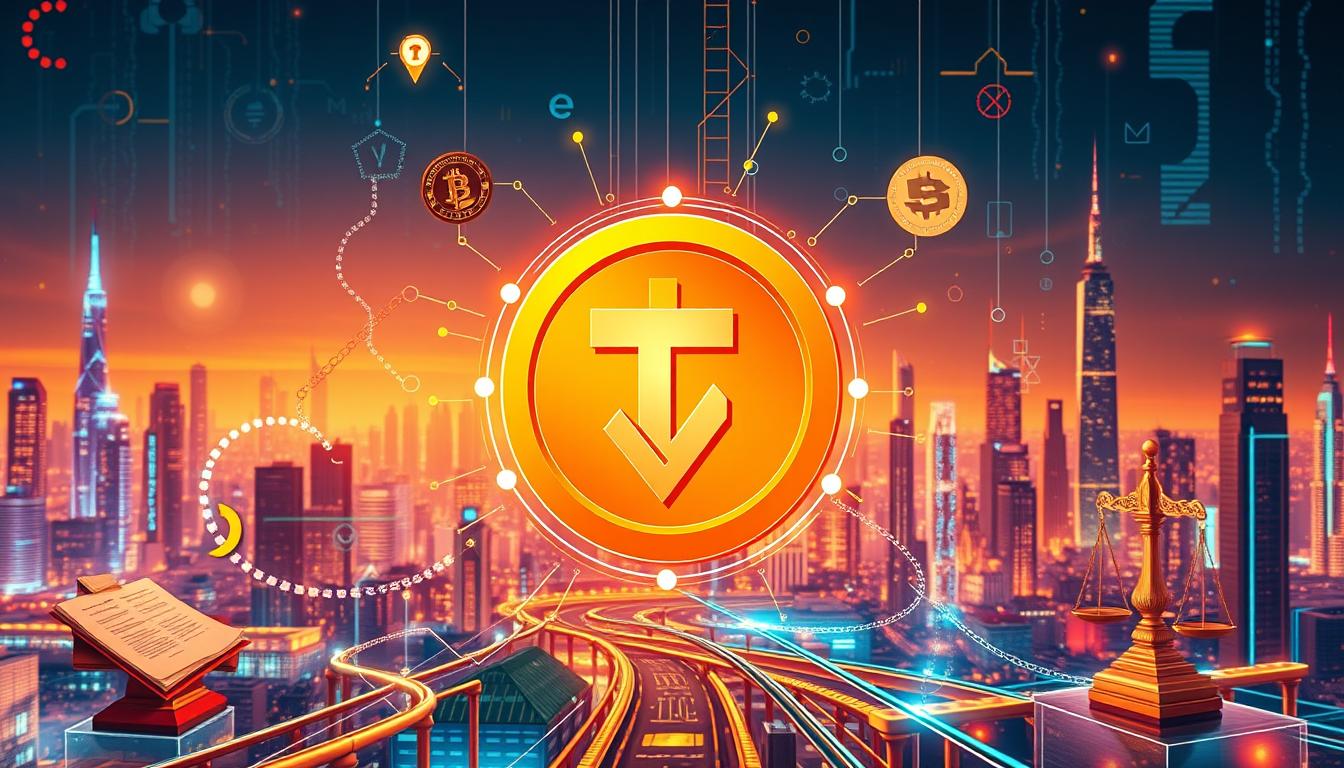Bitcoin recently hit $94,002, showing the crypto market’s wild swings. This surge highlights the need for clear rules in the digital currency world. The TON token and other cryptocurrencies face changing laws in 2024.
Big changes are happening in crypto. Coinbase is ditching wBTC and bringing in cbBTC on the Base blockchain. They cite “listing standards” as the reason for this switch1.
Binance has also made moves. They launched BFUSD, a new asset with a 19.55% APY. This high return raises eyebrows, reminding some of past stablecoin failures2.
These shifts show why knowing TON token rules is key. As laws tighten, investors must stay alert. Understanding the legal landscape helps reduce risks and ensure compliance.
Key Takeaways
- Bitcoin reached an all-time high of $94,002, emphasizing market volatility
- Coinbase is phasing out wBTC and introducing cbBTC
- Binance launched BFUSD with a 19.55% APY
- Regulatory changes are reshaping the cryptocurrency landscape
- Compliance with TON token regulations is crucial for investors
Introduction to TON Token and Its Importance in Crypto
TON Token is a key player in cryptocurrency. It operates on a proof-of-stake blockchain, designed for speed and scalability. TON aims to connect traditional finance with the crypto world.
Overview of TON Token’s Background
TON started as a Telegram project but is now independent. Its blockchain supports smart contracts and decentralized applications. The token’s value has shown resilience recently.
Toncoin (TON) has increased by 8.43% in the last 30 days3. This growth demonstrates TON’s potential in the evolving cryptocurrency market.
The Role of TON in Blockchain Ecosystem
TON is vital in creating a decentralized internet. It offers fast transactions and supports many applications. This versatility makes TON a potential rival to platforms like Ethereum.
| Feature | TON | Other Platforms |
|---|---|---|
| Transaction Speed | High | Varies |
| Scalability | Excellent | Limited |
| Smart Contract Support | Yes | Yes |
| Governance Model | Decentralized | Varies |
TON’s adaptability to changing blockchain laws may be crucial. Its performance differs from tokens like Shiba Inu (SHIB). SHIB saw an over 80% increase in a week3.
This contrast highlights the volatile nature of the crypto market. TON’s stability could be an advantage in this unpredictable landscape.
Current Regulatory Landscape for Cryptocurrencies
The U.S. crypto regulatory landscape is complex and ever-changing. Lawmakers and agencies are working to set clear guidelines. They aim to protect investors and encourage blockchain innovation.
Overview of U.S. Cryptocurrency Laws
Crypto laws in the U.S. differ at state and federal levels. Some states, like New York, have strict rules. The NYDFS has influenced stablecoin regulations and exchange operations.
This regulatory pressure has changed how major exchanges work. It also affects which cryptocurrencies they support.
Key Regulatory Bodies Involved
Several agencies shape U.S. crypto regulations:
- Securities and Exchange Commission (SEC): Focuses on token classification and investor protection
- Commodity Futures Trading Commission (CFTC): Oversees cryptocurrency derivatives and futures markets
- Financial Crimes Enforcement Network (FinCEN): Enforces anti-money laundering protocols and Know Your Customer (KYC) requirements
These bodies strive for balanced regulation. They aim to prevent financial crimes while supporting tech progress.
Cryptocurrencies pose unique challenges for regulators. They must adapt existing rules to new tech and address digital asset risks. As the market grows, expect more detailed regulations to emerge.
These new rules will shape how cryptocurrencies are used in the United States4.
Specific Regulations Affecting TON Token
Cryptocurrency regulations are evolving fast, especially for tokens like TON. Regulators focus on token issuance and decentralized finance oversight. Let’s explore the regulations impacting TON Token.
SEC Guidelines on Token Classification
The SEC determines if a token is a security. This classification is crucial for TON Token. The SEC uses the Howey Test to evaluate investment contracts.
Token issuance guidelines are getting stricter. The SEC closely examines ICOs and similar distributions. TON Token must navigate these rules carefully to avoid legal issues.
Compliance Requirements for Token Issuers
Token issuers face strict compliance rules. These include SEC registration or qualifying for exemptions. TON Token must follow these rules to operate legally in the U.S.
Decentralized finance oversight is growing. Regulators watch stablecoins and yield-bearing assets closely. This affects TON Token’s operations and future plans.
| Compliance Area | Requirements |
|---|---|
| Registration | SEC registration or exemption |
| Disclosure | Transparent financial reporting |
| AML/KYC | Strict customer verification processes |
| Smart Contracts | Audited and secure code |
The regulatory landscape changes quickly. Token issuers must stay updated on guidelines and oversight. This vigilance helps maintain compliance and avoid regulatory problems5.
The Impact of Compliance on TON Token’s Market Value
Compliance with crypto legal frameworks shapes the market value of digital assets like TON Token. As the industry evolves, understanding this relationship becomes crucial for investors and stakeholders.
Regulatory adherence affects token performance. This connection is increasingly important in the ever-changing crypto landscape.
Historical Data on Compliance Effects
Past trends show a strong link between regulatory actions and token valuations. New compliance measures often trigger significant price changes.
GMGN.AI’s 1% transaction fee and varying withdrawal fees show how compliance costs impact token economics4. These measures directly affect a token’s value and market performance.
Security measures like Multi-Factor Authentication (MFA) are now standard in crypto legal frameworks. Cold storage for assets is another key compliance effort.
These practices aim to prevent hacking and boost investor confidence. As a result, they potentially support token value stability4.
Investor Sentiment and Regulatory News
Regulatory developments greatly influence investor behavior in the crypto market. The crypto community’s voting power could affect the 2024 U.S. election outcome6.
This highlights the growing importance of digital asset policies. The interplay between politics and crypto regulations can create volatility in token prices, including TON.
Investor sentiment is especially sensitive to tax policies. India’s 30% tax on crypto profits impacts trading volumes and token valuations6.
The 1% TDS on all transactions further affects the market. These changes show why TON Token stakeholders must stay informed about global compliance trends.
“Regulatory clarity is the cornerstone of sustainable growth in the crypto market. As we navigate this evolving landscape, compliance will remain a key driver of token value and investor confidence.”
The impact of compliance on TON Token’s market value will likely grow. Investors and developers must prioritize digital asset compliance for long-term success.
This focus ensures sustainability and growth in the dynamic crypto market. Staying ahead of compliance trends is crucial for TON Token’s future.
The Future of TON Token Regulations
The TON token crypto regulations are set to change in 2024. The cryptocurrency market has grown significantly, with Bitcoin and altcoins like Shiba Inu hitting new highs3. This growth may lead to refined virtual currency policies from regulatory bodies.
Expected Changes in 2024
2024 might bring clearer TON token regulations. Toncoin’s performance has placed it among the top 10 cryptocurrencies, drawing regulatory attention3. We may see guidelines addressing token classification and investor protection.
Regulators may focus on improving transparency and security in crypto. This could mean stricter reporting rules for token issuers. It may also involve better ways to protect user assets, like PlutoChain’s audit processes3.
Potential Challenges for TON’s Compliance
TON may struggle with evolving SEC guidelines and international crypto laws. The platform must balance innovation and compliance. Contentos faces similar challenges in bridging Web2 and Web3 technologies7.
The crypto market’s volatility poses another challenge. Recent surges in altcoin trading and Bitcoin’s changing relationship with traditional markets may increase scrutiny8. TON must prove its stability and usefulness to maintain regulatory favor.
| Regulatory Aspect | Current State | Expected Change in 2024 |
|---|---|---|
| Token Classification | Ambiguous | Clearer guidelines |
| Investor Protection | Limited | Enhanced measures |
| International Compliance | Fragmented | More unified approach |
| Market Volatility Oversight | Minimal | Increased monitoring |
TON token must navigate these regulatory challenges while staying innovative. The future of TON regulations will require balancing compliance and technological progress. This balance is crucial for TON’s success in the evolving crypto landscape.
Role of Decentralization in Regulatory Framework
Decentralization molds blockchain token laws and DeFi oversight. Blockchain tech drives a revolution in decentralized apps beyond traditional cryptocurrencies9. This shift impacts how regulators approach the crypto space.
How Decentralized Structures Affect Regulations
Decentralized structures pose challenges for regulators. Smart contracts on Ethereum and Chainlink’s data systems showcase blockchain’s growing importance9. These advances demand flexible regulatory approaches.
Blockchain offers trust and transparency across various sectors. This openness aids compliance but raises privacy concerns. Regulators must balance innovation with protection in DeFi oversight.
The Importance of Governance in TON
TON’s governance reflects the industry’s shift to transparent, community-driven models. This aligns with blockchain’s role in protecting intellectual property9. Effective governance ensures TON complies with evolving blockchain token laws.
New blockchain models like Proof of Stake offer greener alternatives. TON’s governance must address environmental concerns while maintaining network security. Balancing decentralization and regulatory compliance remains crucial.
| Aspect | Impact on Regulation | TON Governance Focus |
|---|---|---|
| Transparency | Aids compliance | Community-driven decisions |
| Security | Enhances user protection | Network integrity |
| Scalability | Challenges oversight | Efficient transaction processing |
| Environmental Impact | Influences policy | Sustainable blockchain practices |
Blockchain provides a secure framework for personal data. It empowers individuals and strengthens cyber defenses9. TON’s governance must prioritize security to meet regulatory expectations and user needs.
Engagement with Regulators by TON Community
The TON community actively shapes crypto regulations through various initiatives. These efforts are vital for developing balanced token issuance guidelines. They aim to foster innovation while ensuring compliance.
Initiatives for Open Dialogue
TON members join industry conferences and regulatory roundtables to promote open communication. These events discuss TON’s unique blockchain technology and its regulatory implications.
The community submits detailed proposals to regulatory bodies. These outline TON’s technical features and potential economic impacts. This approach aims to educate regulators and shape future policies.
Case Studies of Successful Engagement
Some crypto projects have set examples for effective regulatory engagement. Major exchanges have worked with authorities to create compliant trading practices. Toncoin (TON) showed an 8.43% increase, possibly due to positive regulatory interactions3.
Blockchain associations have advocated for fair regulations. Their work has led to clearer guidelines for token issuers. It has also improved policymakers’ understanding of decentralized technologies.
TON can learn from these examples and adapt strategies to its ecosystem. Consistent dialogue and commitment to compliance are key. These actions can help TON shape a supportive regulatory environment.
Global Perspectives on TON Token Regulations
TON token crypto regulations and virtual currency policies vary worldwide. Digital assets are gaining importance, leading to diverse regulatory approaches across regions.
European Crypto Regulations: A Progressive Approach
European nations often lead with forward-thinking frameworks for cryptocurrencies. The EU’s Markets in Crypto-Assets (MiCA) regulation aims to unify digital asset oversight.
This framework addresses token classification, investor protection, and market integrity. Europe’s progressive policies have fostered innovation in the cryptocurrency space.
Toncoin (TON) saw an 8.43% increase over 30 days. This reflects positive market sentiment amid clearer regulatory frameworks3.
Asian Markets: Emerging Blockchain Hubs
Asian countries are becoming key players in the crypto space. They’re influencing virtual currency policies globally. The Philippines is emerging as a hub for Web3 gaming and blockchain adoption.
Japan’s policies require exchanges to register with the Financial Services Agency. This approach boosts investor confidence while allowing technological advancement.
South Korea’s recent regulatory changes aim to balance innovation with consumer protection. These efforts shape the regional approach to cryptocurrencies.
| Region | Regulatory Approach | Impact on TON |
|---|---|---|
| Europe | Progressive, unified framework | Positive market growth |
| Asia | Varied, emerging blockchain hubs | Increasing adoption rates |
The global regulatory landscape for TON and other cryptocurrencies keeps evolving. As markets mature, virtual currency policies will likely be refined further.
These changes may influence TON token’s global position and adoption rates. The future of cryptocurrency regulation remains dynamic and promising.
Impacts of Regulatory Changes on Innovation
Regulatory changes greatly affect crypto innovation. Balancing laws and tech progress is key for industry growth. The evolving legal framework shapes how projects develop.
Balancing Innovation and Compliance
Crypto innovators face a tough challenge. They must push limits while following changing rules. This is clear in new blockchain uses beyond finance.
Ethereum’s smart contracts and Chainlink’s data systems show blockchain’s growing role. These tools are changing digital ecosystems in exciting ways9.
Blockchain can change industries and social structures. It offers trust and openness in healthcare, supply chains, and government9. Yet, these new ideas must follow complex rules.
Case Studies of Other Tokens
Recent market moves show how rules affect cryptocurrencies. Bitcoin’s rise to $94,000 raised questions about money and access10. This shows digital money’s impact on society.
The SEC vs. Ripple case shows regulatory challenges. Its outcome could set big rules for U.S. crypto11. It highlights the balance between new ideas and safety.
| Aspect | Impact on Innovation | Regulatory Consideration |
|---|---|---|
| Market Volatility | Encourages rapid development | Need for investor protection |
| Environmental Concerns | Drives green blockchain solutions | Energy consumption regulations |
| Decentralization | Enables new governance models | Challenges traditional regulatory approaches |
The crypto industry is growing up. Laws must support new ideas while managing risks. This balance will shape blockchain’s future and the wider crypto world.
Tax Implications for TON Token Investors
TON token investing has unique tax considerations for U.S. investors. Understanding the tax landscape is vital as digital asset compliance changes. Investors must stay informed to navigate cryptocurrency transactions successfully.
Reporting Requirements for U.S. Investors
The IRS sees cryptocurrencies as property for tax purposes. TON token investors must report all transactions, including purchases, sales, and exchanges. This is crucial for high-net-worth individuals with liquid assets between $1 million and $5 million12.
Keeping detailed records of TON token activities is essential. This includes transaction dates, amounts, and fair market value. Failing to comply with these requirements can lead to penalties.
Strategies for Tax-Efficient Investing
TON token investors can use several strategies to optimize their tax position. These include holding tokens for over a year and using tax-loss harvesting. Considering self-directed IRAs for crypto investments is also an option.
- Hold tokens for over a year to qualify for long-term capital gains rates
- Use tax-loss harvesting to offset gains with losses
- Consider using self-directed IRAs for crypto investments
The wealthy often use debt strategically for investments rather than consumption12. This approach can be applied to TON token investments as well. Investors should be aware of anti-money laundering protocols affecting their transactions.
Staying informed about tax laws and digital asset compliance is crucial. Consulting a tax professional familiar with crypto assets can provide valuable guidance. This expertise helps navigate the complex landscape of TON token investing.
The Future Shape of TON Token Regulation
The crypto regulatory landscape is changing fast, with TON token leading the way. As oversight grows, predicting future changes becomes vital for all involved.
Forecasting Future Developments
TON token rules will likely follow broader crypto trends. Digital signatures from the 1990s built trust in online interactions13. This foundation now shapes crypto regulations.
Blockchain is growing in various sectors. Hospitals use it for patient identity management. Banks use it to verify identities in financial transactions13.
These uses may influence TON token rules. They could push for better security and transparency.
Key Players Influencing Change
Big names in crypto are working to shape future rules. Coinbase CEO Brian Armstrong reportedly met with President-elect Donald Trump14. This meeting could affect key appointments like Treasury Secretary and SEC Chair.
Crypto-friendly leaders in key roles could reshape rules for TON and other tokens. Howard Lutnick, a Bitcoin fan, might become Treasury Secretary14. Such picks could lead to better rules for decentralized finance.
| Potential Appointee | Position | Impact on TON Regulation |
|---|---|---|
| Howard Lutnick | Treasury Secretary | Pro-crypto policies, potential easing of restrictions |
| Hester Peirce | SEC Leadership | Crypto-friendly approach, clearer token classification |
| Bill Haggerty | Key Regulatory Role | Potential balance between innovation and oversight |
Tech advances, industry trends, and key appointments will shape TON token rules. The crypto world keeps changing. TON token holders must stay informed to handle new rules.
Conclusion: Navigating the Regulations for TON Token Investors
TON token crypto regulations are complex and ever-changing. Investors must stay alert and adapt to new digital asset compliance rules. This dynamic landscape affects the entire crypto ecosystem.
Key Takeaways for Stakeholders
TON token investors should monitor regulatory updates closely. TON has experienced significant growth, like other successful projects. LimeWire Crypto’s 2 million Discord members showcase the power of community in crypto15.
Qubetics raised over $2.5 million in its presale, highlighting strong investor interest. These examples stress the importance of community engagement and early investment. The crypto space thrives on active participation and timely action.
Final Thoughts on Staying Compliant
To navigate TON token regulations, focus on transparency and robust governance. Learn from other platforms like GMGN.AI, which emphasizes security with Multi-Factor Authentication4. Adopting such practices can help TON stakeholders maintain compliance.
Staying compliant is crucial for long-term success in digital asset regulations. It ensures stability and growth in the evolving crypto landscape. Prioritize adherence to rules while embracing innovation.





















